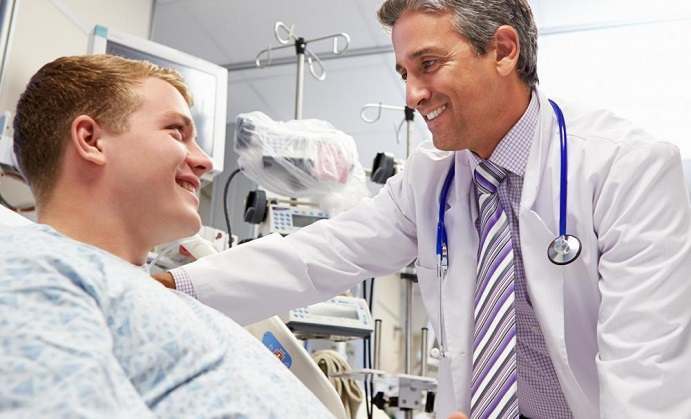It’s a good idea to see a doctor from time to time, especially when noticing changes that might be signs of a prostate problem. Only a doctor can rule out a diagnosis of Enlarged Prostate or Benign Prostatic Hyperplasia (BPH). If there is a problem, a proper diagnosis will be the starting point in treating the condition.
 The doctor will go over the patient’s medical history and request blood and urine samples for testing to get an updated view of the patient’s health. Neurological testing may be required to rule out other issues, such as problems with nerves in the prostate or bladder area.
The doctor will go over the patient’s medical history and request blood and urine samples for testing to get an updated view of the patient’s health. Neurological testing may be required to rule out other issues, such as problems with nerves in the prostate or bladder area.
To get a better idea of the extent of the condition, the patient may be given an American Urological Association symptom chart.
It indexes symptoms according to how they are currently affecting daily activities. While it is not a conclusive diagnostic tool on its own, it helps the doctor get a glimpse into the way the condition is manifesting and if there is any progression.
Common Diagnostic Checks for Enlarged Prostate
- By way of a digital rectal examination, the doctor ascertains the present condition of the prostate, noting its volume and texture. A simple measurement is not a sufficient indicator since it may be proportionally larger than most prostates, yet be the usual size for the body
- A urine culture analysis is done to check for the presence of blood in the urine.
- A creatinine blood test gives information on how well the kidney is functioning.
- And finally, a Prostate-Specific Antigen (PSA) is done to verify the presence of cancer in the prostate. It allows the doctor to differentiate between the symptoms of Enlarged Prostate (BPH) and prostate cancer which are similar, and it tells the doctor how to proceed with treatment.
Common Procedural Methods
 The doctor may opt for a Post-Void Residual Urine examination (PVR) to check the amount of urine in the bladder left after urination. This usually involves an ultrasound and then a check with a catheter entered into the urethra to the bladder.
The doctor may opt for a Post-Void Residual Urine examination (PVR) to check the amount of urine in the bladder left after urination. This usually involves an ultrasound and then a check with a catheter entered into the urethra to the bladder.- A Pressure Flow test may also be done to check bladder pressure during urination. This allows the doctor to locate any blockages and also excludes possible neurological problems.
- A Cystometrogram may be done to assess the storage capacities of the bladder, and it is done concurrently with an Uroflowmetry test to gauge the flow during urination.
- The doctor may perform an ultrasound to see the size of the prostate and its health relative to the kidney. A transducer inserted into the rectum allows the imaging function of the ultrasound.
- A Cystoscopy is used to verify the condition of the bladder and urethra and check for blockages.
- An Intravenous Pyelogram (IVP) gives information on how well the kidney is functioning and if the urine is flowing from the kidney to the bladder as it should.
- A CT Scan or Spiral/Helical Computed Tomography is the final summarizing test that provides detailed information on the state of the prostate, kidney and other internal organs.
Testing for Enlarged Prostate
 No single test conclusively identifies prostate enlargement. However related tests, which apply to both rectum and prostate cancer, can indicate the presence of prostate problems which the doctor can then follow up on. The condition of the prostate depreciates with age, affected by lifestyle choices earlier in life. A digital rectal examination (PSA), a simple yet reliable test, is usually a fundamental part of the annual physical examination, especially for men in their 50s and over.
No single test conclusively identifies prostate enlargement. However related tests, which apply to both rectum and prostate cancer, can indicate the presence of prostate problems which the doctor can then follow up on. The condition of the prostate depreciates with age, affected by lifestyle choices earlier in life. A digital rectal examination (PSA), a simple yet reliable test, is usually a fundamental part of the annual physical examination, especially for men in their 50s and over.
Regular examinations are the key to prevention, especially concerning prostate health. Early detection is a major asset in treating Enlarged Prostate (BPH), and it may save your life. Self-medication can waste valuable time and money. So if you think you might have some of the symptoms, it is advisable to see a doctor, undergo several tests, and get the best possible treatment methods for BPH or any other prostate problem.











